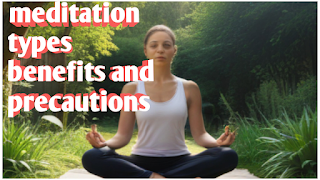Meditation for beginners
My dear friends,
Meditation is a practice that involves training the mind to focus and redirect its thoughts. The goal of meditation is to achieve a mentally clear, emotionally calm and stable state.
Some of the key aspects of meditation include-
1. Concentration
Focusing your attention on a single object, thought or activity to steady your mind. This could be your breath, a mantra or a visual image.
2. Mindfulness
Developing a conscious, open and accepting attitude towards your present moment experience without judgement.
3. Relaxation
Reducing physical and mental stress through deep breathing, body awareness and letting go of worries.
4. Awareness
Observing and accepting your thoughts, feelings and physical sensations as they arise, without getting caught up in them.
Regular meditation brings benefits such as reduced stress and anxiety, improved attention and concentration, increased emotional regulation and greater self-awareness. There are many different meditation techniques, from sitting exercises to moving meditations. The key is to find a style that works for you and make it a regular habit.
Types of meditation
1. Mindfulness meditation
This involves focusing your attention on the present moment, such as your breathing or bodily sensations, without judgment.
2. Concentration meditation
This involves focusing your attention on a single object, such as a mantra, candle flame, or visualization.
3. Loving-kindness (Metta) meditation
This involves cultivating feelings of kindness, compassion, and goodwill towards yourself and others.
4. Body scan meditation
This involves systematically focusing attention on different parts of the body to develop body awareness.
5. Transcendental meditation
This involves silently repeating a personalized mantra to attain a state of relaxed awareness.
6. Movement-based meditation
This includes practices like walking meditation, yoga, tai chi, and qigong that incorporate gentle movements.
7. Spiritual meditation
This involves connecting with a higher power or divine presence, often through prayer, chanting, or contemplation.
8. Vipassana meditation
This is a form of insight meditation that involves observing thoughts and sensations to gain deeper understanding.
9. Zen meditation (Zazen)
This involves sitting meditation with a focus on the breath, posture, and present-moment awareness.
The specific type of meditation you choose can depend on your personal preferences, goals, and spiritual/religious beliefs. Many people find it helpful to experiment with different styles to see what resonates most.
Benefits of meditation
1. Reduced stress and anxiety
Meditation has been shown to decrease the body's stress response and promote relaxation.
2. Improved focus and concentration
Practicing meditation can enhance your ability to focus your attention and stay present in the moment.
3. Increased emotional regulation
Meditation can help you become more aware of your emotions and better able to manage them in a healthy way.
4. Enhanced self-awareness
Meditation encourages you to turn inward and gain deeper insight into your thoughts, feelings, and behaviors.
5. Better sleep
Meditation can help reduce insomnia and improve the quality of your sleep.
6. Decreased blood pressure
Meditation has been found to have a positive impact on cardiovascular health, including lowering blood pressure.
7. Boosted immune function
Some research suggests meditation may enhance the immune system's ability to protect the body.
8. Reduced pain
Meditation can help manage chronic pain conditions by changing the way the brain perceives and responds to pain signals.
9. Increased compassion and empathy
Practices like loving
kindness meditation can cultivate more positive feelings towards yourself and others.
10. Overall sense of well-being
Regular meditation has been linked to greater life satisfaction, happiness, and a sense of meaning.
The benefits of meditation span physical, mental, and emotional domains. Incorporating even a few minutes of practice each day can make a meaningful difference.
Precautions in meditation
1. Start Slowly
If you're new to meditation, start with just 5-10 minutes per session and gradually increase the duration over time. Trying to meditate for too long initially can be overwhelming.
2. Find a Comfortable Spot
Choose a quiet, peaceful location where you won't be disturbed. Make sure you have a comfortable chair or cushion to sit on.
3. Avoid Meditating After Meals
It's best not to meditate immediately after eating a large meal, as this can make you feel drowsy or unfocused.
4. Stay Hydrated
Drink plenty of water before and after your meditation session to avoid dehydration.
5. Don't Force It
If your mind is racing and you're having trouble focusing, don't get frustrated. Gently bring your attention back to your breath or the present moment.
6. Listen to Your Body
If you start to feel any physical discomfort, such as pain in your back or legs, stop and adjust your posture or try a different position.
7. Avoid Meditating Before Bedtime
Doing meditation right before bed can make it harder to fall asleep for some people.
8. Consult a Professional
If you have any medical conditions or are taking medications, it's a good idea to talk to your doctor before starting a meditation practice.
9. Start Slowly with Eyes Closed
Friends If you're new to meditation, it's generally best to start with your eyes open until you feel comfortable closing them.
Remember, meditation is a personal practice, so listen to your body and mind and do what feels right for you. Be patient and gentle with yourself as you develop a consistent practice





No comments:
Post a Comment